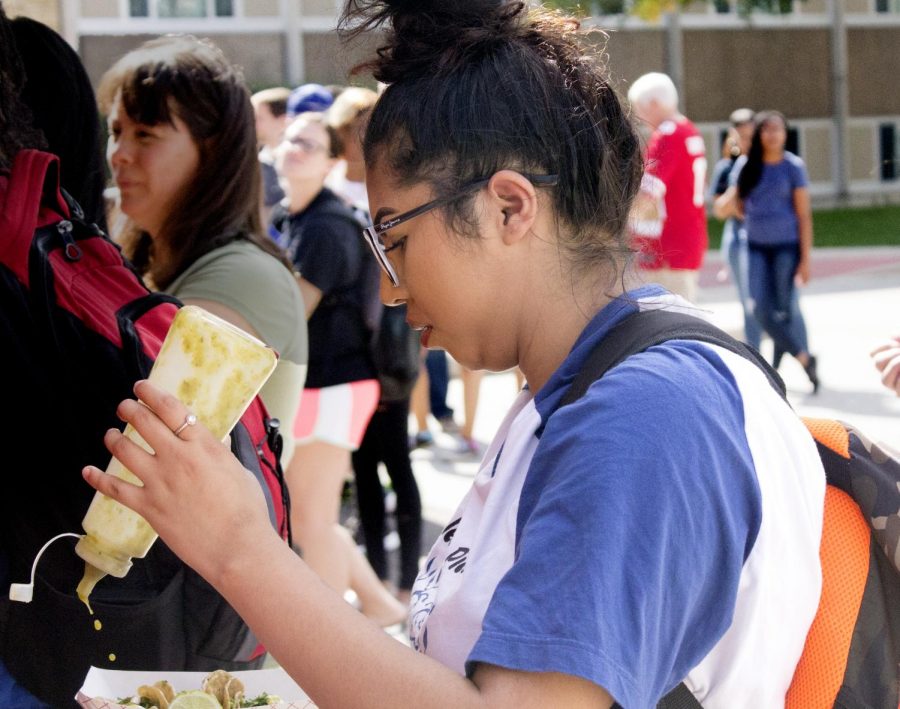Student panel to discuss ‘What is Latinx?’
Corryn Brock | The Daily Eastern News
Jackie Renteria, a junior pre-nursing major, gets her lunch after waiting in a line of over twenty people for food from Vita’s Mexican Food Truck, which is a part of Latino Heritage Month. Renteria said she enjoyed having the food truck on campus. “I think it’s cool that a lot of people on campus get to experience authentic Mexican food,” said Renteria. The next Latino Heritage Month event will be the “What is Latinx?” student discussion panel that will take place Thursday in the Charleston-Mattoon Room of the Martin Luther King Jr. University Union.
October 3, 2018
A student discussion panel called “What is Latinx?” will take place at 7 p.m. Thursday in the Charleston-Mattoon Room at the Martin Luther King Jr. University Union.
The Latin American Student Organization, Latin American Studies, the Department of Foreign Languages, and the Latino Heritage Celebration Committee will sponsor the panel.
Spanish professor Kristin Routt said the purpose of the panel will be to create a discussion about how students identify themselves according to their community or background and what that means to them.
“We hope to get lots of audience discussion and questions from the audience,” Routt said. “We hope that people will learn about the variety of backgrounds of people that sometimes we tend to lump together just because, say, they speak Spanish.”
The panel will begin with an introduction by Vanessa Landrus, a professor of Spanish and coordinator of the Latin American Studies program.
Landrus taught a class in the past about Latinx culture and literature.
“We’re going to talk about ‘What is Latinx?’ ‘How do you pronounce it?’ also the evolution of the term from ‘Latino’/’Latina’ to ‘Latinx’ and also some other terminology,” Landrus said.
The panel will also include discussion about the geographic aspect of the some of the terms, such as “Chicano” or “Boricua” and will be formatted as an informal conversation.
“It’s going to start with informative discussion, but from there it’s going to be open discussion,” Landrus said. “That’s the goal.”
Routt gave the example of a student who is Mexican and had little experience with the term “Latinx.”
“Even though a lot of people would look at her and say, ‘Oh, you must be Latinx,’ she was like, ‘I don’t know, I don’t know what that means,’” Routt said. “I hope that people no matter which they identify with will come and learn something.”
Routt also said the discussion is meant to create a relaxed environment for those present to share thoughts and experiences.
“It’s meant to be totally friendly discussion,” Routt said. “It’s meant to be informative, especially to people outside these communities.”
Landrus said she is most looking forward to the discussion and sharing experiences with the audience and students about the terms and their uses.
“I hope there is interest among the audience to talk about these terms and also what is their experience with using these terms,” Landrus said. “Sometimes a person is being called one name that has nothing to do with where the person is coming from or the language they speak.”
As for the panel, Landrus said she hopes the students and the audience find it informative as well as an opportunity to share experiences and grow as individuals.
“We open up and discuss what is the current use and significance of these terms in our experience as Latino Americans, as Latinos, as students and faculty at EIU, and we learn about how to use these terms,” Landrus said. “Nobody wants to be called something that’s not correct, so it is important that we know what is the significance of these terms.”
Mercury Bowen can be reached at 581-2812 or [email protected].



















































